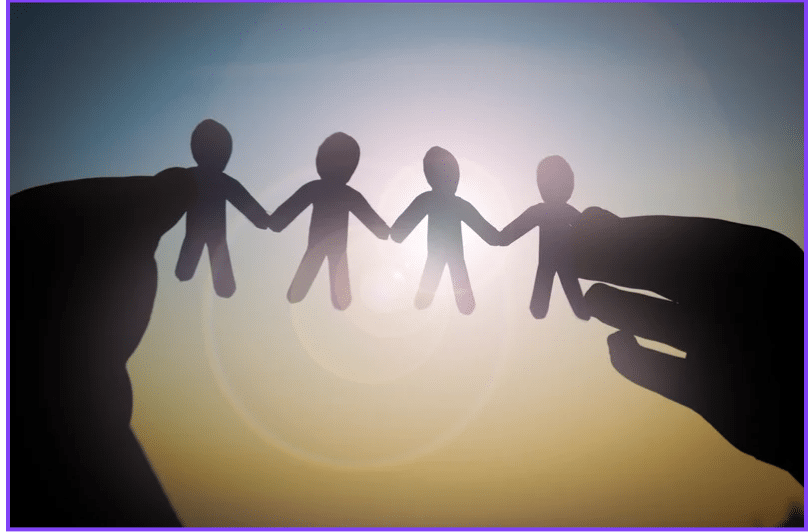“Where there is love there is life.”
Mahatma Gandhi
While most people think of diet, exercise, and stress as the key areas to monitor during their health and wellness journey, there is one vital area many people don’t consider: Relationships.
Relationships with those around you have an important impact on your health. In fact, they impact areas such as diet, exercise, and stress, which can throw off your whole routine. While not all relationships are going to be the same for everyone, for most people key relationships include familial relationships, intimate relationships, working relationships, and social relationships. All of these can affect your levels of happiness and your mental health.
Mental Health and Relationships
Studies have shown the effects of social connections on mental health. Since the 2020 pandemic, when many people found themselves isolated from family and friends, mental health and happiness have been in decline. Data has shown that, in many cases, this was caused by the intense feelings of isolation and loneliness since the COVID-19 lockdowns.
On the other hand, when social interaction is high and healthy, it offers many health benefits. According to the CDC, when people are socially connected and part of a community, they are more likely to make healthy decisions. What’s more, they have a support structure around them during stressful and difficult times. This helps to alleviate the feelings of loneliness and isolation.
Health Benefits of Social Relationships
Here are just a few of the known benefits of having happy and healthy social relationships:
- Improve your ability to recover from stress, anxiety, and depression.
- Promote healthy eating, physical activity, and weight.
- Improve sleep, well-being, and quality of life.
- Lower the risk of chronic illness.
- Reduce the risk of violent or suicidal ideation.
The benefits of social relationships can be felt throughout the body. Lowered stress can impact other health issues such as blood pressure. Eating healthy impacts chronic illnesses such as diabetes. There are even studies showing the impact falling in love has on helping to regulate your immune system.

Result of Loneliness
When most think of loneliness, they imagine someone without anyone else around them. Someone isolated. Someone simply alone. However, that is not always the case. Many times people can feel extremely lonely even when surrounded by friends, family, partners, or community.
Loneliness is when someone feels disconnected from others, considers themselves to have no meaningful relationships, or has no sense of belonging. Everyone has their own desired level of connection they want from their relationships and if they aren’t getting that, it could make them feel lonely.
Several factors come into play when it comes to how likely a person is to feel isolated and lonely. Here are a few examples of people who are statistically more likely to feel loneliness according to the CDC:
- Low-income adults making less than $50,000 a year or lacking access to resources.
- Older adults, especially those who are living alone, are unpartnered or have no children.
- People who live with chronic diseases, disabilities, or mental health disorders.
- Members of the LGBTQIA+ community, especially young adults.
- People who are marginalized or discriminated against.
- Those who live in rural areas.
- Those going through major life transitions.
Health Detriments of Loneliness
Here are just a few of the known results of loneliness:
- Greater risk of heart disease, stroke, and type 2 diabetes.
- Depression and anxiety.
- Self-harm or suicidal thoughts.
- Addiction.
- Dementia.
Tackling loneliness
Building new strong relationships and improving the relationships you already have are some of the best ways to combat loneliness. While there is no one-size-fits-all way of meeting new people and maintaining relationships can be complicated, there are universal steps you can take.
To help strengthen or maintain your current relationships, understand what you want and need from them. What’s more, recognize the support you need and the support you can return within your relationship. Prioritize making time to spend with people. Make meaningful connections through shared experiences and interests. You can also address some of the barriers that may be keeping you from maintaining a strong connection, such as time management, transportation restrictions, or technology.
Building new relationships and meeting new people can be stressful, but it doesn’t have to be. There are several ways to meet new people as well as help establish a more social life. Here are a few examples:
- Explore new activities with or without your current friends.
- Join a group, class, book club, or something similar that meets regularly.
- Volunteer in your community or get involved with community organizations in your city.
- Express interest in meeting some of your friend’s other friends.
- Get to know your neighbors.
- Join an online community.
If you are struggling with loneliness, especially if it is impacting your mental and physical health, consider speaking with a mental health professional. Tackling it on your own can be difficult, but well worth the hard work.

How Health Coaches Can Help
Health coaches are a great resource for making healthy lifestyle changes. Their support and guidance can also help clients who are struggling with relationships when working in conjunction with a mental health professional. Health coaches make wonderful accountability partners, helping clients make sustainable changes.
For health coaches looking for more resources on how to help clients better understand how their relationships are connected to their overall health, check out two of our Ask The Expert webinars.
Relationship expert Jillian Turecki shares her professional insight into the connection between relationships and overall health. She offers tips on how to discuss relationships with clients. What kind of questions should coaches ask? What resources can they share with clients? This webinar is a great resource for coaches navigating this topic. Watch the webinar here.
Dr. Kalea Wattles is an expert in fertility and preconception health. She discusses the science behind love, relationships, and sexual health. Does love play a part in fertility? It does, and Dr. Wattles shares her best advice for coaches and clients. Check out the webinar replay.
Remember that strengthening and maintaining relationships is a skill that shouldn’t be taken for granted. It can not only lead you to live a happier and healthier life, but it will also do great things for your mental health.
Our Latest Blogs
-

Alumni Spotlight: Michelle Papanicolaou
Read Full Article: Alumni Spotlight: Michelle Papanicolaou -

FMCA Community Impact Scholarship Recipients For September 2025 Announced
Read Full Article: FMCA Community Impact Scholarship Recipients For September 2025 Announced -

Healing the Microbiome: A Deep Dive into L. reuteri
Read Full Article: Healing the Microbiome: A Deep Dive into L. reuteri

